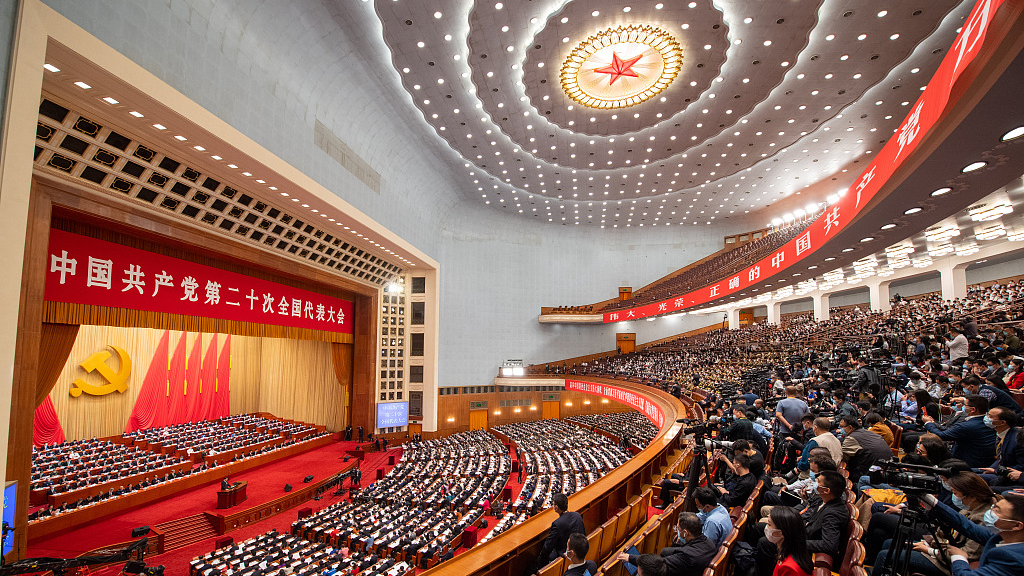Published: October 23,2022
By Bereket Sisay

The 20th CPC National Congress opens at the Great Hall of the People in Beijing, capital of China, October 16, 2022. /Xinhua
In a report delivered to the 20th National Congress of the Communist Party of China on October 16, Xi Jinping said that China plays a crucial role in the reform and development of the global governance system. He said that China will pursue a vision of global governance featuring shared growth through collaboration.
In recent years, global governance has been tested. Environmental threats, health risks, and security flaws have emerged as serious deterrents for the world at large. Additionally, inconsistency in actions, insufficient collaboration, lack of sustainable funds and technical support, incompetency at different levels, misrepresentation, priority problems, and others are becoming more perilous to the global administration system.
Consequently, many of the UN’s noble goals, which span across different sectors, have not been realized while a handful of other countries are left behind. Although the internal socioeconomic and political situation has been blamed for the flop, global governance is also responsible for it.
The flaws are becoming much more menacing to the causes of multilateralism and global partnership, which are building blocks to a shared development and common growth. These emerging challenges should be addressed with concerted global collaboration since the problems are multidimensional, requiring diverse actors to act accordingly. Furthermore, several developing countries in Latin America, Asia and Africa require tailored assistance to rescue them from their tangled economic problems and other snags.
These flaws in the global system would deliver a big blow, especially to the Global South, which stands entitled to this universal global agglomeration if the world is expected to grow equally. These perils are not only a threat to the incumbent global administration system; they pose a grave risk to the upcoming generations as well.
Hence, global governance is drifting into a complex defiance that needs to reverse course. Preventing such plagues from creeping into tomorrow requires swift action-oriented measures. Accordingly, the UN has pursued a range of reform programs to pull off the UN and its subsidiary agencies toward their missions. China has worked alongside with UN member countries to resolve the challenges gripping the organization.
Nonetheless, China has expressed its opinions over the ongoing UN reform by endorsing multilateralism, and augmenting the UN’s authority and competence, as well as its capacity to confront new threats. China seeks to re-adjust the system to fulfill its international obligations, and to stand on par with its status as the world’s second biggest economy, as well as a permanent, veto-carrying member of the UN organ – Security Council.
The UN Security Council held an open meeting at the initiative of China, which held the rotating presidency this month at the UN headquarters in New York, August 22, 2022. /CFP
China’s pragmatic role in the reform and development of these international institutions and their systems holds much meaning by shaping the international governing system to benefit all and to create a better world, given China’s emerging influential global impacts.
China is voicing, restructuring, and amending these systematic dysfunctions to ensure more effective international missions. The nation’s status as a bigger developing country can position China as a balancer along the spectrum of a polarized axis. Its positional-driven attempt to strike equilibrium can usher in another opportunity for China to amplify its leadership over the reforming and developing the global governance system.
Yet, China should also push for a swift process to complete the UN reform programs. The world is moving toward realizing the UN-Sustainable Goals. Meanwhile, more challenges remain on the horizon, which run against multilateralism and hinder greater cooperation. Therefore, the emerging challenges can only be repelled jointly rather than by unilateral actions exerted by a particular actor or actors.
Therefore, China’s role, combined with other countries’, can bring about more tangible results. Cooperation to embark on reforms and develop the UN and its subsidiaries must be strengthened now. The future depends on the present collective actions; and so the more robust the decisions are, the better the world will become.
Bereket Sisay is a commentator of international affairs, with a special focus on Africa.
 Africa -China Review Africa -China Cooperation and Transformation
Africa -China Review Africa -China Cooperation and Transformation
